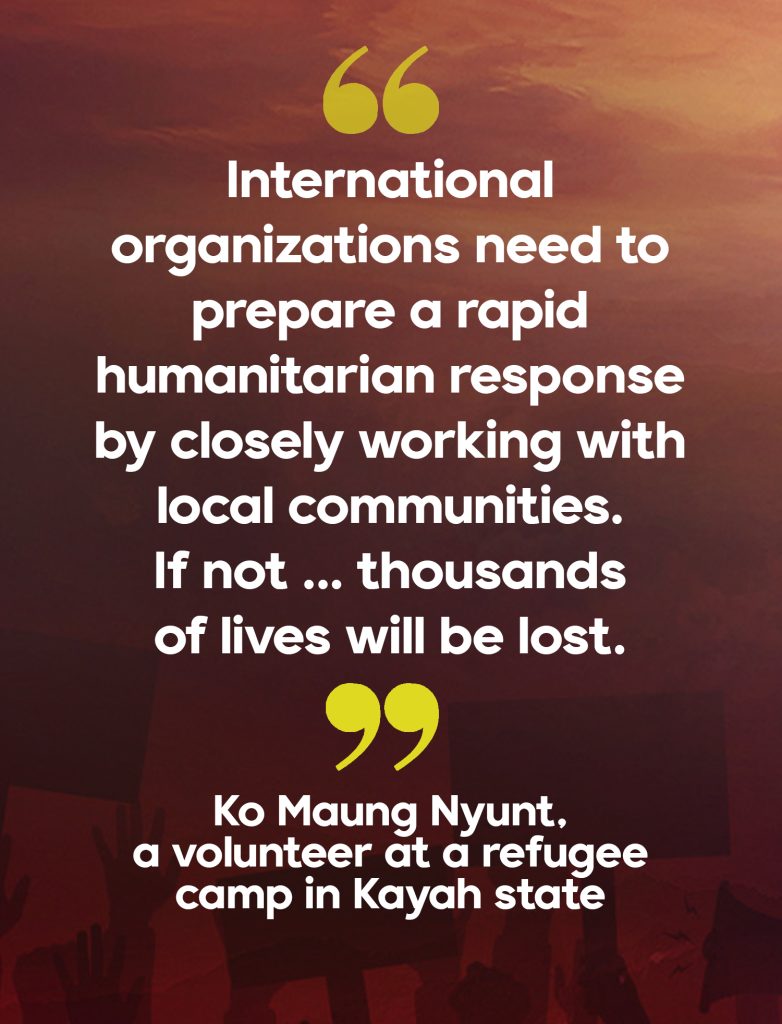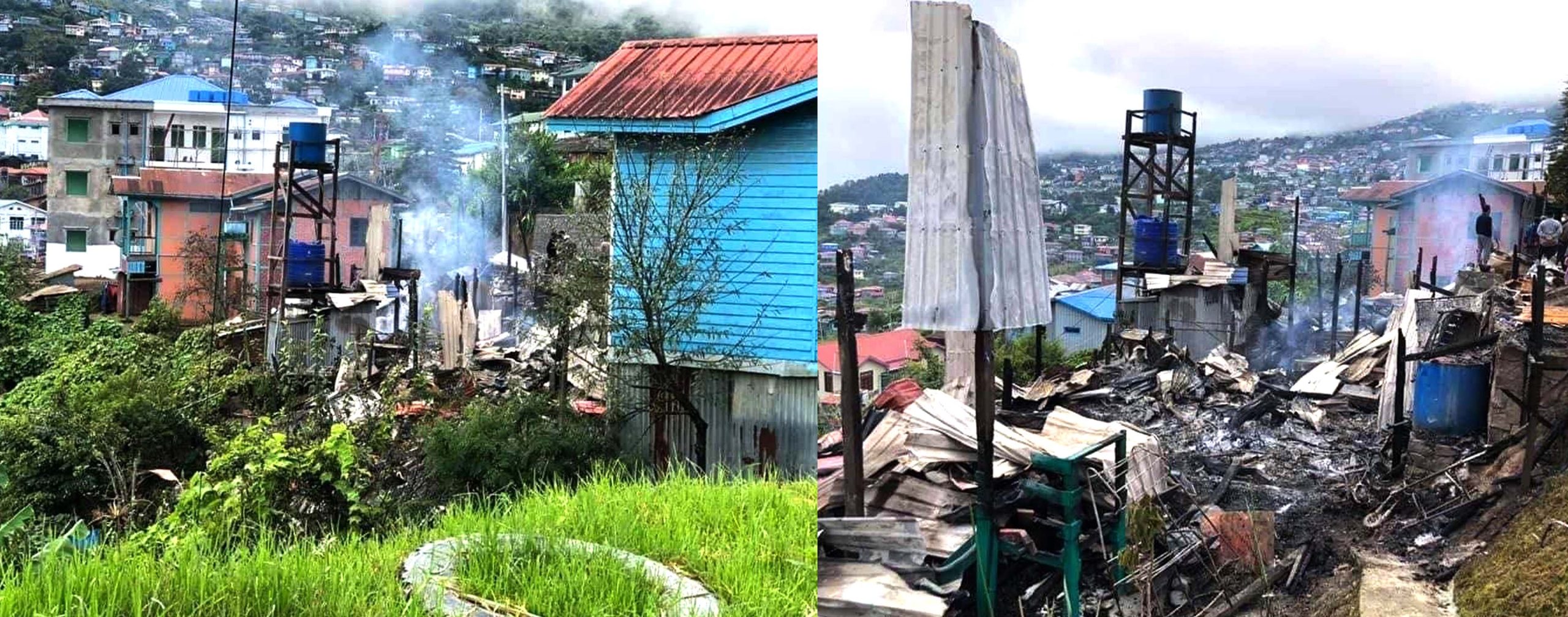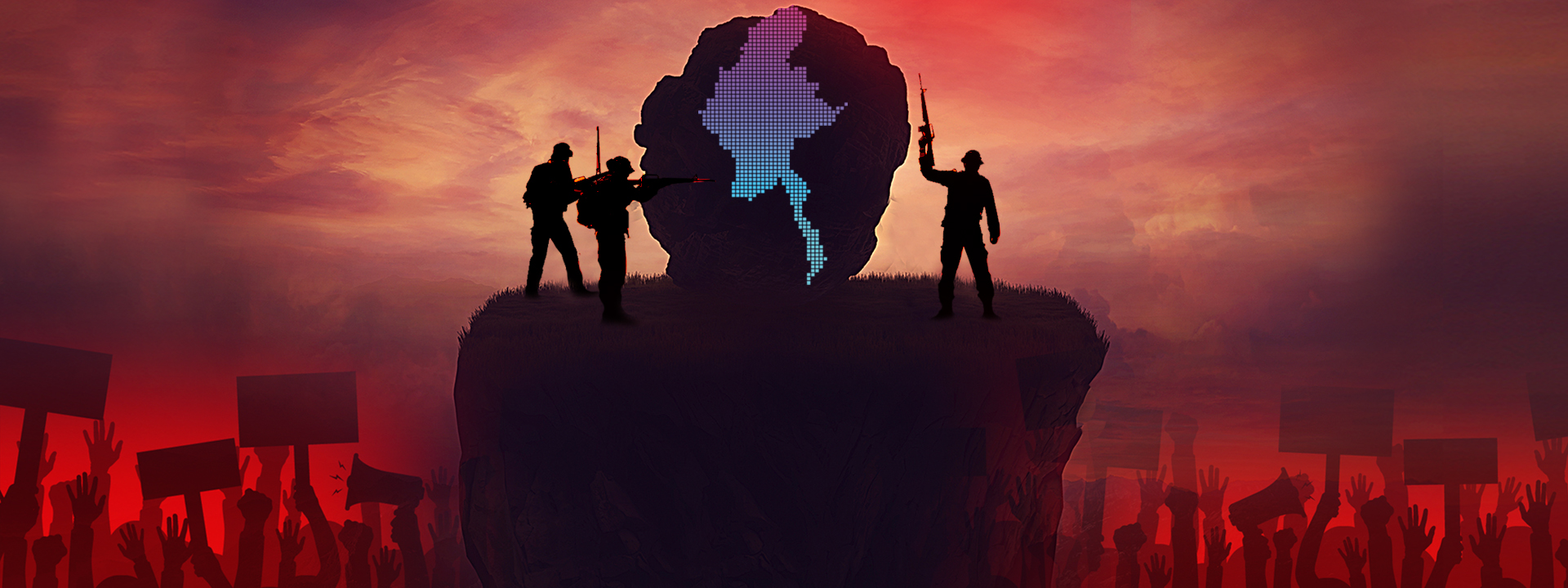On 13 September 2021, Myanmar’s National Unity Government (NUG) decided that the Burmese people had had enough. After enduring months of brutal, often deadly repression from the Tatmadaw and frustrating inaction from the international community, the civilian-elected leadership declared a state of emergency in the country and launched the “people’s defensive war“ against the military junta.
For the first time since the coup in February, the NUG explicitly acknowledged and announced its support for armed resistance. The people of Myanmar were going to war.
“With the illegal and failed coup having entered its eighth month, it is clear that the military junta is not interested in a peaceful political settlement but will continue to use violence in an attempt to gain power,” said the NUG in a press release announcing the nationwide uprising. “The excessive and deadly force already used against peaceful protesters by the military has driven young people to take up a force-ready self-defensive revolution.”
It added, as a rallying call to the people: “The NUG calls for the unity of all the people of Myanmar to uproot the military oppressors — the perpetrators of violence against the people — for good and to establish a peaceful federal democratic union that fully safeguards equality, freedom, inclusion, and democracy for all.”
The international community seems to frown on the NUG’s violent response to the junta and instead is pushing for a peaceful resolution of the crisis. But the people of Myanmar are having none of it.
“We have expected too much from the international community and all they have given us was just words, not actions,” said Hlaing Hlaing, 21, who used to be a peaceful protester. “Many people still hope for support from the international community though there is nothing to expect from them. It is time to rely on ourselves.”
And rely on themselves they did. Shortly after the declaration of the nationwide uprising, several local and self-organized People Defense Forces, previously fragmented and disorganized, rallied behind the NUG. In general, civilians and armed resistance groups have welcomed the NUG’s declaration. “Of course, people are motivated by the clear standpoint of the NUG as the leading political front,” said Ma Win, a Yangon-based social science researcher.
But war is war, with all the horrors it brings. “This is the start of a revolution and we have to get through a lot more,” said one youth member of an armed resistance group. “We need more and proper resources to protect and defend the people of Myanmar from the terrorist junta forces.”

A civilian armed group and local residents of the Sagaing region, in the northwest of Myanmar, stage a protest after the national unity government launched its defensive war against the military junta. (Photo courtesy of a citizen journalist in Myanmar)
Nowhere safe
The Tatmadaw seemed eager to meet the NUG’s armed resistance with violence of their own. Following the NUG’s declaration of the defensive war, there was an uptick in clashes, explosions, and shootings carried out by military forces across the country. Mai May, a Chin State youth active in the movement, said: “The noises of shooting and explosions have been heard quite often since the defensive war launch.”
Roi Ja, a Kachin State resident, said that “there have been more war fronts against the military, and the violence is escalating.”
According to estimates of the NUG’s own Ministry of Defense and Ministry of Home Affairs and Immigration, the number of clashes nearly tripled from 42 during the first week of September to 122 just two weeks later, after the declaration of the people’s resistance.
The junta also put up more checkpoints across the country, which have led to the baseless arrests of innocent civilians. Escalating night raids, often resulting in the death of civilians, now take place nearly every night. On 15 September, just two days after the NUG launched the revolution, armed forces raided the township of Kamayut in the northern-central part of Yangon. Six civilians were arrested.
Ten days later, on 25 September, the military descended on the Sanchaung township, located next door to Kamayut. Four civilians, two of whom were medical workers, were killed in the night raid.
“Night raids and arrests happen almost every day in Yangon, and without any valid reason,” said Paing Paing, a local student. According to Khun, a resident of Bago region to the north of Yangon, this crackdown is a manifestation — and evidence — of the military’s insecurities. “The military is quite afraid of the people’s defense, so they increased their oppressions against the civilians. They even limit the time of going around the town.”

The junta’s aggression has further revealed how the rule of law has weakened in Myanmar. Because they have law enforcement under their control and fear no intervention from local or international courts, the military leadership is able to commit many heinous crimes with impunity. In turn, fear has permeated the Burmese society, forcing everyone indoors, especially the youth, since their sector had been particularly active in the resistance.
“Many people we know are being arrested day after day,” said Shin Shin, a youth advocate. “There is nowhere safe for young people in Myanmar.”
Cracks in the military ranks
The NUG’s declaration of war has brought another interesting, if not encouraging, development: defections. In the township defense force of Hakha alone, there have been more than 150 police defectors since the armed resistance began. People’s Soldiers and People’s Embrace, two assistance groups that support the defectors, are working with the NUG to facilitate the safe passage of junta defectors into citizen defense groups.
Data from People’s Embrace confirm that across different towns and regions, there was an uptick in military defection after the NUG declared war. According to Ma Win, the Yangon-based researcher, these defections could belie cracks in the military ranks.
“The number of military defectors will be increasing because the junta forces are feeling desperate due to sustaining some defeats and a lack of people’s support [for the junta],” Ma Win said. “At the same time, the NUG, defector assistance groups, and local defense forces also give defectors guarantees and incentives, including money and safe passage into the liberation areas.”
Descent into chaos
The onset of the armed civilian resistance has raised the stakes for the tug-of-war over Myanmar’s liberation and has left much of the country in a state of destruction and chaos. In an apparent show of might, junta groups have deployed their military equipment to intentionally destroy public property.
In a recent clash with local forces in the Thantlang township in Chin state, 19 houses were burned down, forcing thousands of residents to flee. On 18 September, junta forces also set one home on fire when they deployed their heavy weapons in the Hakha township. From the Chin state in the west to Kayah in the east, this pattern of military-enforced destruction has become the norm throughout Myanmar.
Yu Yu, a resident of Kayah state, said, “It has been several nights that I could not sleep well because I am always afraid of losing my parents and of my house burning down during the unexpected clashes and raids of junta forces.”
Other malign actors, not necessarily aligned with either the junta or citizen forces, have also taken advantage of the confusion. Driven by economic difficulty and political instability, the crime rate in the country is climbing, adding to the sense of insecurity engulfing towns, villages, and households.
“Cases of robbery and thievery have become more common,” said Roi Ja, a resident of Myitkyina, capital of Kachin State, lying along the western bank of the Ayeyarwady River. “People are not safe whether they are on the street or in their homes. Due to how difficult life has gotten these days, some people opt to steal from houses and fields that had been raided by the junta forces.”
The chaos has also driven thousands of people away from their homes. “After the defensive war was launched by the NUG, the clashes in Loikaw, Demoso, and Mobye towns [in the Kayah region] have escalated. The number of refugees skyrocketed from dozens to thousands in the span of a few days,” said Ko Maung Nyunt, a volunteer who works at a Kayah state camp for internally displaced peoples.
According to him, while they would typically have around 100 people, the camp population shot up to nearly 3,000 a few days after the war commenced.
Like many of the refugees, most people, especially in urban centers, will have nowhere to go. To cope, some have started stocking up on food and supplies and hunkering down with radios and emergency bags. Other people, particularly those in non-urban areas, have even set up their own bomb shelters in preparation for the worst. Caught in the crossfire, most of Myanmar’s people are left completely unprepared for a full-blown armed conflict.
“There is no place to flee, like shelters, and no one can build bomb shelters here in Yangon,” said Shin Shin, a local resident. “Many of us urban folk have no experience of war, which will make it difficult for us to survive.”

After the NUG’s declaration of war, the junta forces stepped up their night raids. They left villages, including these houses in Hakha township in Chin State, in ruins. (Photo courtesy of a citizen journalist in Chin State, Myanmar)
Lethal irony
The NUG’s Ministry of Humanitarian Affairs and Disaster Management has put out a series of guidelines and stay orders while the conflict is underway, and has advised civilians to prepare emergency bags for themselves. The ministry has also worked with local organizations to beef up support for internally displaced peoples. But beyond these measures, little more is being done. Since the declaration of war, both the civilian government and forces have been preoccupied with their military activities.
This leaves Myanmar’s innocent bystanders stuck in a lethal irony. They know full well, though, why their democratic leaders, fed up with the international community’s inaction, chose to pick up arms and take the fight for liberty into their own hands. Now, on the brink of a full-blown civil war and with the same leaders swept up in the motions of armed struggle, they have nowhere to turn to but the international community.
“The international or intergovernmental organizations need to prepare a rapid and effective humanitarian response by closely working with local communities,” Ko Maung Nyunt said. “If not, it will be too late. Thousands of lives will be lost.”
He stressed, however, that the aid needs to be coursed through the NUG or independent local and faith-based conduits, free from the influence of the junta. “No one will trust the delivery of assistance from junta forces. They have a record of stealing and selling the humanitarian assistance for their own profits,” said Khun Khun, a resident of the Bago region.
Now that the nation is on the brink of a full-scale civil war, he and many in Myanmar are well aware that unless such war is averted, there will be massive starvation, extreme poverty, and unimaginable loss as they are pushed deeper into political turmoil that shows no sign of abating. ●
Jesua Lynn is an independent researcher and peace-education trainer. He has been working in youth development, peace education, and reconciliation for more than four years. He authored and co-authored more than four publications in Myanmar in the fields of human rights, hate speech, youth activism and peace-building.



















